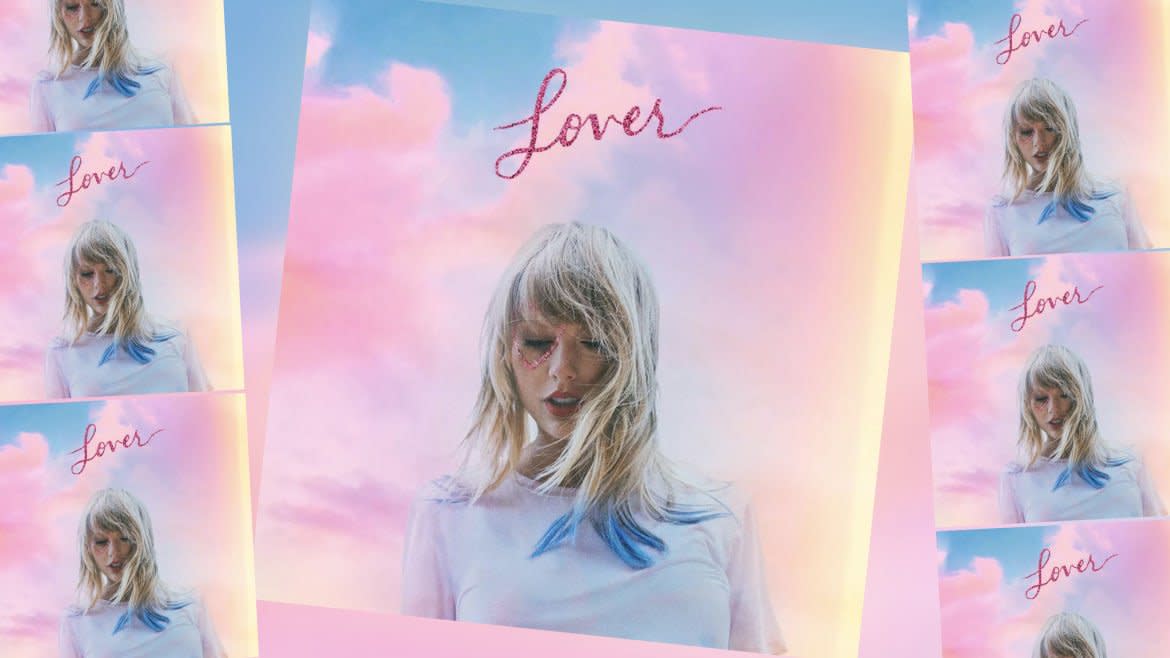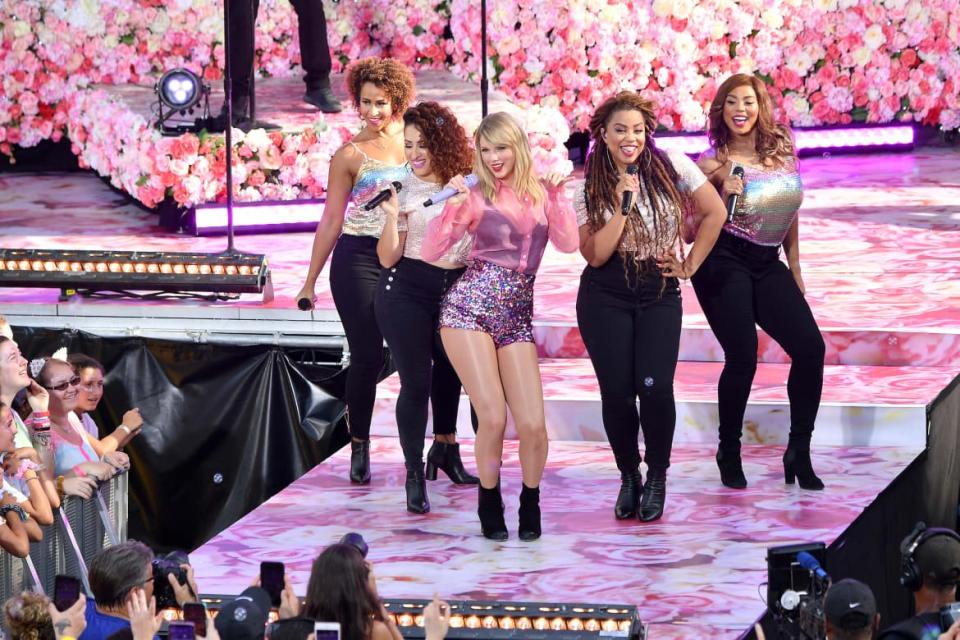On ‘Lover,’ Taylor Swift Shades Trump, Takes on Sexism, and Fights for LGBTQ Rights

Taylor Swift’s seventh studio album, Lover, released on Friday, features the boldest political statements of the artist’s career. And I’m not just talking about her decision to reclaim the cringe-inducing titular phrase—until now uttered only by elderly relatives and Will Ferrell in that one SNL sketch—as a cute, fun thing to call a significant other.
The long and arduous lead-up to Lover saw four singles, beginning with the late-April release of “Me!,” three music videos, a dramatic shift in TayTay’s Instagram aesthetic, and an unprecedented focus on the singer’s political leanings. With the release of the album, she proves to fans and critics alike that her political awakening goes deeper than branding.
When “Me!” dropped, featuring Panic! At the Disco’s Brendan Urie, TSwift stans were gifted a peppy, pastel-washed music video packed with promises about the new era of Taylor. Her petty Reputation days were behind her, with snakes swapped for butterflies and nary a Kanye West reference in sight. The song itself was fairly uncontroversial, save for the Sesame-Street-style refrain, “Hey kids, spelling is fun!” (which was notably removed ahead of the album’s release).
In June, however, with Pride month in full swing, Swift released the second single off the album, and it was doozy. “You Need to Calm Down” appeared to be an attempt at a gay-rights anthem, though the mixed metaphors and ambiguous lyrics left some scratching their heads. Lest we forget the line, “Why are you mad when you can be GLAAD?” in which Tay seems to be urging the haters to literally become the LGBTQ media-watchdog organization. The accompanying music video left little room for interpretation. It starred an impressive roster of queer pop-culture icons, from the Fab Five, to “Lesbian Jesus” Hayley Kiyoko, to Laverne Cox.
Inside Taylor Swift’s Bold Anti-Trump LGBTQ Stand: ‘Treat All of Our Citizens Equally’
Regardless of whether people loved “You Need to Calm Down,” or loved to hate it, it was irresistible fodder for debate. The song was the first emphatic, unquestionable statement from Swift, who had gained notoriety in years past for staying mum on political and social issues. LGBTQ critics were divided on whether or not the catchy song and video constituted allyship or appropriation. The answer exists somewhere in between. Yes, Swift was finally using her platform to spotlight important causes, and she was backing her words with financial support of pro-LGBTQ organizations and political support in the form of letters and petitions promoting the Equality Act. And yet, it was hard to ignore that “You Need to Calm Down” and her new “woke” image were also clearly part of an orchestrated, headline-grabbing marketing campaign for her upcoming album.
Now, two months later, Lover is here to offer some clarity on how to interpret Swift’s seemingly sudden interest in civic responsibility. First, it must be said that a majority of Lover is familiar, neutral Swift territory—sweeping, piano-forward ballads and ‘80s-inspired synth-pop songs about love and what happens when it’s lost. She teases a return to her country origins (and makes Fearless disciples like myself cry for more!) on a collaboration with the Dixie Chicks about her mother’s ongoing battle with cancer. Most of the songs on the lengthy 18-track album are good, a few are great, and all of them pack the quick-witted lyrical punch for which Swift is regularly praised.
That the entire album is not an hour-long political manifesto should come as no surprise. Devoted Swifties know that the lead singles from her albums have rarely been interpreted as indicators of what is to come. Often, they act as sonic red herrings that stand out stylistically from the rest of the album. Reputation, for example, was thankfully light on the maniacal revenge energy and Right Said Fred influence of its first single, “Look What You Made Me Do.” Only three of the songs on Lover, including “You Need to Calm Down,” engage directly with political and social issues.
The third track on the album, “The Man,” deals with a topic Taylor Swift knows all too well: sexism in the music industry. The first few seconds of “The Man” sound eerily like the opening of a HAIM tune as Swift sings, “I would be complex, I would be cool…Every conquest I had made would make me more of a boss to you.” After all, a Taylor Swift album would not be complete without a self-aware reference to the exhaustive tabloid coverage of her dating life. As “The Man” unfolds, Swift imagines how people would perceive her actions differently if she were a man. Her frustration is palpable in the chorus: “I’m so sick of running as fast as I can, wondering if I’d get there quicker if I was a man.” She even throws in a cheeky dig at notorious womanizer Leonardo DiCaprio for good measure (“And they would toast to me, oh, let the players play / I’d be just like Leo in Saint-Tropez”).
The popstar, who was recently named the highest-paid celebrity by Forbes with estimated earnings of $185 million in 2019, also laments the double standard applied to financial success. “If I was out flashing my dollars,” Swift sings, “I’d be a bitch not a baller.” “The Man” is already being heralded as a feminist anthem, proof of how far she’s come since she awkwardly distanced herself from the phrase “feminist” in an interview with The Daily Beast back in 2012. (She has since vocally identified as a feminist, explaining to The Guardian in 2014 that she didn’t have an accurate understanding of what the word meant when she made her initial comments.)
The 29-year-old tackles politics more broadly in Lover’s seventh track, “Miss Americana & the Heartbreak Prince,” which uses the fraught social dynamics of high school as an allegory for American political disillusionment in the wake of the 2016 election. It’s like if Election’s Tracy Flick wrote “You Belong with Me.” Produced with frequent collaborator (and Lorde’s songwriter partner) Joel Little, the song is surprisingly not as weird as it sounds.
In the first verse, over a slow-burning melody reminiscent of her 2015 single “Wildest Dreams,” Swift sings, “American glory faded before me / Now I’m feeling hopeless, ripped up my prom dress.” A subsequent reference to seeing a scoreboard and running for her life can safely be interpreted as her response to Donald Trump winning the presidency. Later, she croons, “we’re so sad, we paint the town blue” and “my team is losing, battered and bruising,” presumably aligning herself with the Democratic party, or “the losing team” in the election.

The singer confirms her political intentions in the notes accompanying Spotify’s Love, Taylor: Lover Enhanced Album. One note reads, “This song is about disillusionment with our crazy world of politics and inequality, set in a metaphorical high school.” She even appears to level a snarky insult directly at Trump with the line, “boys will be boys then, where are the wise men?” twisting his ridiculous dismissal of the infamous Access Hollywood tape in which he brags about “grabbing women by the pussy” as “locker-room” talk.
Some people may still be feeling queasy about how her colorful, megaphone-loud endorsement of gay rights doubled as the album’s most effective promotional tactic—not helped by the fact that the subject does not actually factor much into the overall album, which is essentially a tribute to her heterosexual relationship with British actor Joe Alwyn.
But in response to this criticism, Taylor herself might point to her takedown of double standards in the “The Man.” In a preview for her interview with CBS Sunday Morning, Swift remarks, “There’s a different vocabulary for men and women in the music industry.” “Give me an example,” her interviewer, Tracy Smith, requests. “A man does something, it’s ‘strategic,’” Swift says. “A woman does the same thing, it’s ‘calculated.’” Hiding political dissidence in a pop song seemingly about a high school relationship is just that—strategic. It’s a clever way for Swift to appease the cynics demanding she take a stand without coming across as preachy or exploitative. And more than anything, it finally feels sincere.
Get our top stories in your inbox every day. Sign up now!
Daily Beast Membership: Beast Inside goes deeper on the stories that matter to you. Learn more.
